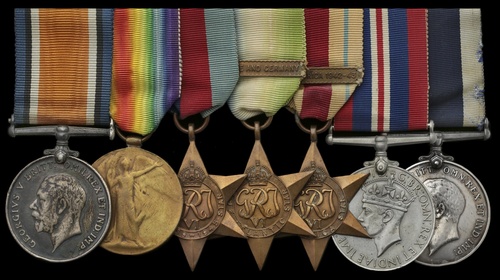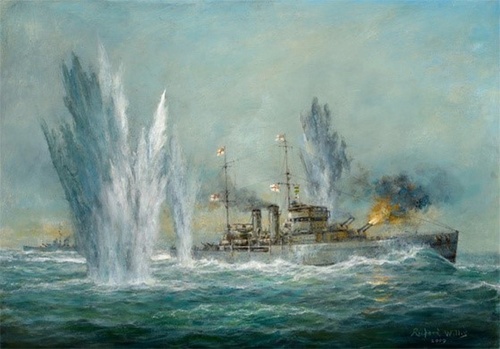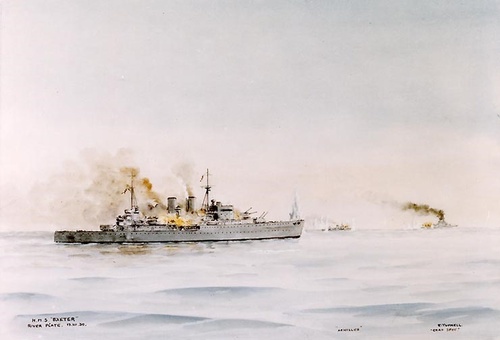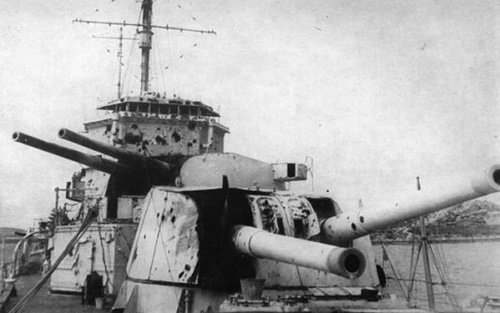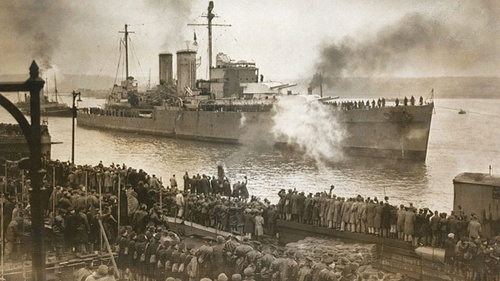Auction: 22003 - Orders, Decorations and Medals
Lot: 380
13 DECEMBER 1939: THE RIVER PLATE
"EXETER", "AJAX" AND "ACHILLES"
'As I was crossing the compass platform [to the Action Station in the Director Control Tower], the captain hailed me, not with the usual rigmarole of 'Enemy in sight, bearing, etc.', but with "There's the fucking Scheer! Open fire at her!" '
Exeter's Gunnery Officer recalls a memorable command; throughout the battle the crew of Exeter thought they were fighting the Graf Spee's sister ship, Admiral Scheer.
A Great War and Second World War campaign group of seven awarded to Petty Officer T. J. G. McIntosh, Royal Navy, who was present in H.M.S Exeter during her gallant and costly part in the celebrated battle of the River Plate
Her ship's company sustained a total of 84 casualties, over 60 of them fatalities, an ordeal vividly recounted by the ship's Senior Medical Officer:
https://jmvh.org/article/the-battle-of-the-river-plate-excerpts-from-the-diary-of-surgeon-commander-jack-cussen-rn-pmo-of-hms-exeter/
British War and Victory Medals (J. 87764 T. J. G. McIntosh, Ord., R.N.); 1939-45 Star; Atlantic Star, clasp, France and Germany; Africa Star, clasp, North Africa 1942-43; War Medal 1939-45; Royal Navy L.S. & G.C., G.V.R., 3rd issue, coinage head (J. 87764 T. J. G. McIntosh, A.B., H.M.S. Furious), mounted as worn, edge bruising and contact marks, the G.V.R. awards fair to fine, the Second War awards good very fine (7)
Thomas James George McIntosh was born at Cinderford, Gloucestershire on 13 July 1900 and entered the Royal Navy as a Boy 2nd Class in July 1918. He subsequently served as an Ordinary Seaman in H.M.S. Colossus until February 1919.
Awarded his L.S. & G.C. Medal in July 1933, McIntosh joined the cruiser Exeter in the summer of 1936 and was likewise employed - as a Petty Officer - on the renewal of hostilities.
The River Plate
The commencement of hostilities found Exeter acting as part of Commodore Harwood's South America Cruiser Squadron - Force G - also comprising Cumberland, Ajax and Achilles, the whole having been ordered by the Admiralty to locate and sink the commerce raiding German pocket battleship Admiral Graf Spee.
Two of the Admiral Graf Spee's victims, S.S. Doric Star (sunk, 2 December 1939) and S.S. Tairoa (sunk, 3 December 1939), had succeeded in transmitting wireless signals before being going down and, upon receipt of the report of the attack on Tairoa, Harwood correctly concluded that the Admiral Graf Spee's next destination would be the River Plate.
At dawn on 13 December, the Admiral Graf Spee sighted Exeter off the estuary of the River Plate and closed at full speed, opening fire at 0617 with her six 11-inch guns at a range of 19,000 yards, thus beginning the celebrated battle of the River Plate. Exeter, also closing at full speed, got her 8-inch guns into action four minutes later at a range of nine miles. Ajax and Achilles meanwhile worked their way north-east to split the German's fire but it was Exeter who bore the brunt of the enemy ship's attention:
'Just five minutes after the commencement of the action, an 11-inch shell burst alongside the British ship [Exeter], killing the Torpedo Tubes' Crews. A minute later she received a direct hit on 'B' turret which put her two 8-inch guns out of action. Splinters swept the bridge, killing or wounding all but three of the officers and ratings there. The Captain escaped and, finding the bridge out of action and the wheel-house communications wrecked, he made his way aft to fight the ship from there. As he did so, Exeter received two more direct hits from 11-inch shells forward. Nevertheless, a few minutes later she fired her starboard torpedoes at the Admiral Graf Spee, but before they reached their mark the pocket battleship had turned away under cover of smoke ... Two more 11-inch shells hit the Exeter, causing further casualties and extensive damage. One entered the hull and started a fierce fire between the decks. The other put the fore-most turret and its two 8-inch guns out of action. It was on the occasion of these hits that the spotting aircraft reported, "She has completely disappeared in the smoke and flames."
However, she emerged and re-entered the action. In doing so the men of the Exeter proved again the indomitable spirit of the Royal Navy. Their ship was badly stricken. Two of the three turrets were out of action, leaving her no guns forward. She had a 7 degrees list and was down by the head. All her compasses had been smashed, and the captain was handling the ship with the aid of a small boat's compass. In these circumstances she altered course towards the enemy and fired her port torpedoes ... The Exeter, gradually dropping astern, fought on until she had nothing left to fight with. At about 7.30 a.m. her sole remaining turret was flooded. Ten minutes later she turned to the south-east and slowly limped away, making necessary running repairs as she went' (The King's Cruisers, by Gordon Holman, refers).
However, having suffered serious damage herself, the Admiral Graf Spee was obliged to make for the port of Montevideo. Rather than renew the action, Captain Langsdorff famously scuttled his command on 17 December 1939.
The gallant Exeter suffered losses of 61 killed and 23 wounded in the action.
A glimpse of the preparation of her dead for burial at sea is to be found in the obituary of one of her last survivors, Basil Trott:
'He was then detailed to assist in the gruesome task of picking body parts from the wreckage and sewing them up in weighted hammocks for burial at sea. He recalled: "It was impossible to separate who was who and it was a matter of putting together bits and hoping those that those that you had sewn up in a hammock were all the same person." '
The Daily Telegraph, 28 July 2021, refers.
McIntosh departed Exeter in April 1940 and is known to have served in the cruiser Kenya from August 1940 until at least the end of 1941.
He was invalided from the service on 25 April 1945.
Subject to 20% VAT on Buyer’s Premium. For more information please view Terms and Conditions for Buyers.
Sold for
£1,400
Starting price
£350

